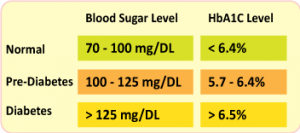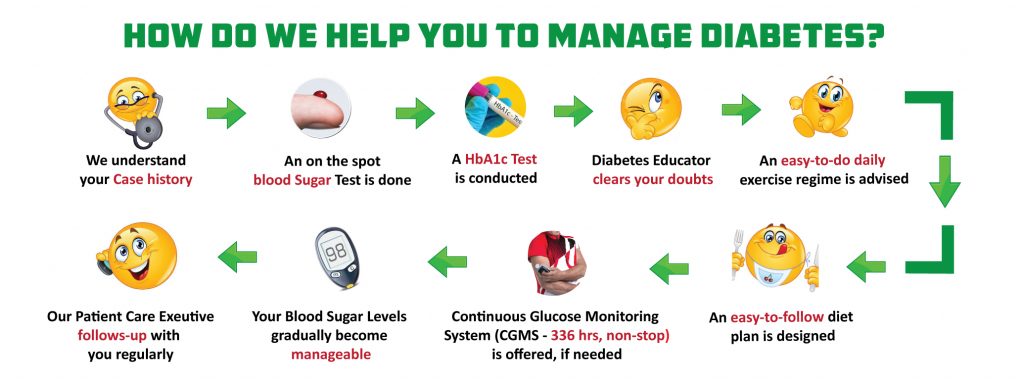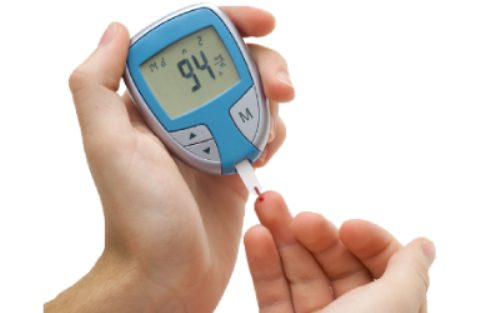DIABETES OVERVIEW
In simplest terms, Blood Sugar levels are controlled by a hormone called Insulin, produced by Pancreas in our abdomen. Insulin allows the cells of the body to use Glucose for energy. When the amount of Glucose (Sugar) in body becomes higher than required, because, the body is not able to use it properly, then that condition is referred to as Diabetes.
Relative or complete decrease in production of Insulin from pancreas cause increase level of blood glucose.
Produce less amount of insulin from pancreas and variable degree of insulin resistance which cause increased glucose production in liver and fat cells.
It refers to the onset or initial recognition of glucose intolerance during pregnancy, usually in the second or third trimester.
There are also genetic defects of insulin action, beta cells of pancreas, exocrine disease of pancreas, endocrinopathies, drug induced diabetes.
Type-I Diabetes
Type 1 diabetes is generally caused when the body attacks itself by mistake which results into stopping your body from making insulin. Roughly 5-10 percent of the people who have diabetes have type 1 diabetes. Symptoms of type 1 diabetes frequently develop snappily. It’s generally diagnosed in children, teens, and adults. However, you’ll need to take insulin every day to survive if you have type 1 diabetes. presently, type 1 diabetes is impossible to prevent.
Type-II Diabetes
In type 2 diabetes, your body doesn’t use insulin well and can’t keep blood sugar at normal situations. About 90-95 percent of people with diabetes, have type 2 diabetes. It develops very slowly and is generally diagnosed in grown-ups. Initially symptoms are hard to notice, so it’s important to get your blood sugar tested regularly if you’re at threat. Type 2 diabetes can be averted or delayed with healthy life changes, like, losing weight, eating healthy food and being active.
Pre-diabetes
Pre-diabetes, as the name suggests, is a condition just before entering the blocks of Diabetes. About 8 in 10 people don’t know they are about to become diabetic. In pre-diabetes, the blood sugar levels are more than normal, but not high enough to cause type 2 diabetes. Prediabetes raises your threat for type 2 diabetes, heart complaint, and stroke. But there’s good news. If you have prediabetes, taking timely preventive measures like, lifestyle changes can help you to reverse it.
Gestational Diabetes
Gestational diabetes develops in pregnant women even when they never had diabetes. However, if you have this type of diabetes, the baby could be at high risk for health problems. Gestational diabetes generally goes down after your baby is born. But, it may increase your chances of getting type 2 diabetes later in life. Your baby may become obese as a child or teen and develop type 2 diabetes in future.
SYMPTOMS OF DIABETES
Recognizing the symptoms of diabetes is important for early diagnosis and timely management. Here are some of the common symptoms associated with diabetes.
Frequent urination: Increased thirst and frequent urination are common symptoms of diabetes. The kidneys work hard to remove excess glucose from the blood, increasing urine output.
Excessive thirst: Diabetes can lead to dehydration due to frequent urination. As a result, individuals experience insatiable thirst and a constant need for sweets.
Unexplained weight loss: Rapid or unexplained weight loss can occur in patients with diabetes, especially type 1 diabetes good as an energy source, and break down muscle and fat tissue.
Fatigue and weakness: Feeling tired, weak and lethargic is common in diabetes. When the body is unable to properly metabolize glucose into energy, individuals can feel bloated and lack energy.
Increased appetite: Despite eating regularly, people with diabetes can experience increased appetite. This is because the body does not get enough glucose into its cells, causing a constant feeling of hunger.
Blurred vision: High blood sugar levels can affect the pupil of the eye, causing blurred or crooked vision. If diabetes is properly managed, this symptom can improve.
Slow wound healing: Diabetes can prevent the body from healing wounds properly. Wounds, cuts, or wounds take longer to heal and are more susceptible to infection.
Shock and seizures: Chronically high blood sugar levels can damage nerves, leading to peripheral artery disease. This condition can cause numbness, tingling, or a “pins and needles” feeling, usually in the arms and legs.
CAUSES OF DIABETES
Diabetes is a serious disease that can be affected by a variety of factors. Understanding the risk factors can help individuals take the first steps to manage or reduce the risk of developing diabetes. Here are some common causes of diabetes:
Genetic predisposition to diabetes: A family history of diabetes can increase the risk of developing the condition. Certain genetic factors can make individuals more susceptible as insulin resistance or insulin inactivity, which are the mechanisms leading to diabetes.
Lifestyle factors: Unhealthy lifestyle choices can contribute to type 2 diabetes. Poor diet, overeating sugary and processed foods, being sedentary and not exercising can lead to weight gain, insulin resistance and risk of diabetes which is increased.
Obesity: Being overweight or obese is a major risk factor for type 2 diabetes. Excess body fat, especially around the abdomen, can interfere with insulin action and increase insulin resistance. Achieving a healthy weight is important in the prevention and management of diabetes.
Insulin resistance: Insulin resistance occurs when the body’s cells do not produce enough insulin, the hormone that regulates blood sugar levels The condition usually occurs as a result of obesity, lack of exercise and a poor diet selectively, and can lead to type 2 diabetes.
Sedentary lifestyle: Lack of physical activity and sedentary lifestyle contribute to diabetes. Regular exercise helps maintain a healthy weight, improve insulin sensitivity, and promote overall health. Conversely, lack of physical activity can increase the risk of diabetes.
Poor diet: A diet high in processed foods, refined carbohydrates, sugary drinks and saturated fats can contribute to diabetes These dietary choices contribute to weight gain, insulin resistance and diabetes levels in blood increase.
Gestational diabetes: Some women develop diabetes during pregnancy, called gestational diabetes. Metabolic changes and increased insulin demand during pregnancy can result in transient insulin response. Women who have had gestational diabetes are at increased risk of developing type 2 diabetes later on.
Pancreatic disease: Certain medical conditions that affect the pancreas, such as pancreatitis or pancreatic cancer, can impair insulin production and increase the risk of diabetes Age and race: Age plays a role in diabetes risk, and the risk of developing type 2 diabetes increases with age. Additionally, individuals from certain ethnic groups, including Africans, Hispanics, Asians and Native Americans, are at increased risk for developing diabetes
PREVENTION OF DIABETES
Leading a healthy lifestyle, managing your weight, and being active in maintaining overall health can reduce your risk of type 2 diabetes. Remember, prevention is always better than cure when it comes to diabetes, small changes in daily habits can have important long-term health consequences. Diabetes is a chronic disease that can be very detrimental to health. Fortunately, individuals can take a few proactive steps to reduce their risk of developing type 2 diabetes, the most common form of the disease Here are some basic ways to prevent diabetes.
Healthy eating: Taking a balanced and nutritious diet is important in preventing diabetes. Focus on eating a variety of fruits, vegetables, whole grains, lean proteins and healthy fats. Limit sugary foods, processed foods, and drinks with added sugar. Controlling portion sizes and eating mindfully can also be beneficial.
Regular exercise: Regular exercise plays an important role in preventing diabetes. Aim for at least 150 minutes of vigorous physical activity each week, such as brisk walking, biking, swimming, or dancing. In addition, include strength training exercises in your routine to improve muscle strength and insulin sensitivity.
Weight management: Maintaining a healthy weight to reduce the risk of diabetes. If someone is overweight or obese, even modest weight loss can have a positive impact on diabetes prevention. Adopt a balanced diet, exercise regularly, and seek the help of a registered health professional or dietitian to create a weight management plan.
Limit sedentary time: Prolonged sedentary lifestyles, such as sitting or lying down for extended periods of time, are associated with an increased risk of diabetes Divide your sedentary time by taking opportunities though perform exercises throughout the day, including regular movement breaks, standing or exercises during work or leisure time.
Manage stress: Chronic stress can contribute to diabetes. Find positive ways to manage stress, such as relaxation techniques (meditation, deep breathing exercises, yoga), after hobbies or activities you enjoy , spending time with loved ones, and enlisting the help of friends, family, or employees when needed.
Limit alcohol intake: Drinking too much alcohol has been shown to increase the risk of diabetes. If you choose to drink, do so in moderation. Men should limit their beverage intake to no more than two standard drinks per day, and women should limit their drinking to one standard drink per day. It is important to be aware of the effects of alcohol on blood sugar levels and make appropriate choices.
Avoid tobacco: Smoking increases the risk of various health issues including diabetes. If you smoke, quitting is one of the best things you can do for your overall health. Seek help from health professionals or support groups to quit smoking successfully.
Regular health checkups: Regular medical checkups can help identify risk factors and allow for early detection of diabetes or pre-diabetes. Check your blood pressure, cholesterol and blood sugar regularly. If you have a family history of diabetes or other risk factors, discuss appropriate screening tests and preventive measures with your health care provider.
DIAGNOSIS FOR DIABETES
- Measure random blood sugar / fasting blood sugar
- HbA1c test
- Your test results must adhere to the following values:

DIABETES MANAGEMENT BY DR MONGA MEDI CLINIC
Managing Diabetes is very tricky. It can’t be cured, but it certainly can be controlled. It is controllable to an extent that you can lead a healthy life happily even with diabetes as a part of your life. This is not easy, but neither is it impossible as such.
At DMAMC our focus is to tackle all the three factors viz. Ignorance, Denial and Fear. This clears the path of overcoming diabetes with courage and conviction. Instead of feeling depressed, our patients enjoy the challenge of defeating diabetes through a step wise scientific approach. At DMAMC, the Diabetic patients manage and successfully overcome their diabetes with the active support, guidance and encouragement of our entire Diabetes Management Team.
Our effective Ayurvedic formulations in combination with modern healthcare techniques have successfully helped patients suffering from Diabetes. We have facilities to correctly diagnose Diabetes. As a part of our treatment process, we counsel the patient and help him beat the fear of diabetes. We give them easy to follow diet plan and exercises. We follow up with the patients on regular basis, so that the chances of non-compliance by them are reduced.
Diabetes is controllable, provided you are determined to control it.
DIABETES MANAGEMENT THROUGH AYURVEDA
It is important to note that Ayurveda does not replace the traditional treatment of diabetes. Instead, it can internalize them by improving insulin sensitivity and helping to control blood sugar levels. Collaboration between Ayurvedic physicians and general practitioners is essential to ensure an integrated and personalized approach to diabetes management.
With the consistency and adherence to the principles of Ayurveda, individuals can achieve improvements in blood sugar control, insulin sensitivity and overall quality of life but must be consulted and monitored by qualified medical professionals regularly to ensure safe and effective management of diabetes through Ayurveda.
Ayurvedic principles aim to restore balance in the body and improve overall well-being. Ayurveda sees diabetes as due to imbalanced doshas and poor digestion. Diabetes management in Ayurveda includes dietary changes, lifestyle changes, herbal remedies and specific therapies.
Dietary recommendations in Ayurveda to manage diabetes include eating whole grains, fresh vegetables, lean proteins and healthy fats. Ayurvedic herbs and spices like bitter melon, Indian gooseberry, fenugreek and cinnamon are known for their ability to regulate blood sugar levels these can be included in the diet or taken as herbal supplements.
Lifestyle changes are important in Ayurvedic diabetes management. This includes following a daily routine, moderate exercise or yoga, meditation and other stress management techniques, and making sure you get enough sleep.
FREQUENTLY ASKED QUESTIONS
Diabetes management involves lifestyle changes, medication (if needed), and regular blood sugar monitoring. Basic management includes a healthy diet, regular exercise, managing stress levels, managing blood sugar, taking prescription medications as directed, and medical examinations who will go regularly
Diet plays an important role in the management of diabetes. It is important to eat a balanced diet that includes a variety of fruits, vegetables, whole grains, lean proteins and healthy fats. Limiting sugary foods and drinks, refined carbohydrates, saturated and trans fats is also important. It is best to work with a registered dietitian or diabetes educator to develop a personalized meal plan.
Yes, exercise is an important part of managing diabetes. Regular exercise improves insulin sensitivity, reduces blood sugar levels, promotes weight loss, and reduces the risk of diabetes Take at least , do 150 minutes of moderate intensity exercise each week, and strength training exercises.
Yes, exercise is an important part of managing diabetes. Regular exercise improves insulin sensitivity, reduces blood sugar levels, promotes weight loss, and reduces the risk of diabetes Take at least , do 150 minutes of moderate intensity exercise each week, and strength training exercises.
While there are various alternative treatments and supplements marketed for diabetes management, it is important to consult with a healthcare professional before trying any new treatment or supplement. Some supplements may interact with medications or have unpredictable effects on blood sugar levels. It is best to rely on evidence-based medical advice and follow a comprehensive treatment plan.
Yes, Ayurveda can play a significant role in managing diabetes. It focuses on holistic healing and balancing the body, mind, and spirit. Ayurvedic treatments, lifestyle modifications, and herbal remedies can help control blood sugar levels, improve insulin sensitivity, and reduce the risk of complications associated with diabetes.
Ayurveda emphasizes the balance of doshas (vata, pitta, and kapha) to maintain overall health. For diabetes management, the focus is on balancing the dosha related to digestion and metabolism, known as “agni.” Ayurvedic principles also emphasize dietary modifications, stress reduction techniques, regular exercise, and herbal remedies to manage diabetes effectively.
Yes, Ayurveda provides specific dietary recommendations for diabetes management. It emphasizes whole foods that are easy to digest, such as whole grains, fresh vegetables, lean proteins, and healthy fats. It also suggests avoiding processed foods, sugary and sweetened beverages, and foods with high glycemic index. Ayurveda may also recommend specific herbs and spices to include in the diet, such as turmeric, fenugreek, and bitter gourd.
Yes, Ayurveda utilizes various herbs and herbal formulations to support diabetes management. Some commonly used herbs include bitter melon (karela), Indian gooseberry (amla), gymnema (gurmar), holy basil (tulsi), fenugreek (methi), and cinnamon. These herbs are believed to have properties that can help regulate blood sugar levels, improve insulin sensitivity, and support overall metabolic health.
Panchakarma is an Ayurvedic detoxifying rejuvenation treatment that includes various cleansing methods. While Panchakarma is not a direct cure for diabetes, it can be useful as a supplementary treatment. By eliminating toxins, reducing stress, and improving overall well-being, Panchakarma therapies can help manage diabetes effectively
Ayurveda can complement, but not completely replace, traditional treatments for diabetes. It is important to consult with a qualified Ayurvedic practitioner and work together with your health care provider to develop a comprehensive treatment plan. Ayurveda can help improve the effectiveness of traditional treatments and support overall well-being.
Ayurveda can be useful in managing both type 1 and type 2 diabetes. However, individual results may vary, and the effectiveness of Ayurvedic treatments may depend on various factors such as the severity of the condition, overall health, adherence to Ayurvedic principles etc.. You are Discuss with an Ayurvedic practitioner who can make appropriate recommendations based on your specific needs .
When performed properly and under the guidance of a qualified practitioner, Ayurvedic treatments are generally considered safe. However, individual feelings and allergies may vary. It is important to disclose your medical history and any ongoing treatments to your Ayurvedic practitioner to ensure safe and effective management of diabetes.












